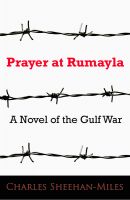 Available at Amazon.com
Available at Amazon.comRepublic is a frightening portrayal of a future America in economic decline struggling against the brunt of globalization and troubled by domestic terror attacks. This future America is a nation where civil liberties are virtually nonexistent and federal power overreaches in the name of anti-terrorism. The writing is vital, gripping, and convincing; the voice true and rooted in the world it creates and its populist characters. The characters are real, and the vision offered by Miles is compelling enough to make you fear that you’re doing something subversive simply by reading the book. This is an engrossing read.
West Virginia National Guard Colonel Ken Murphy as he is inexorably drawn into conflict that erupts in a small town when a computer plant, and major employer, is closed without warning, leaving him, along with thousands of employees, without a paycheck and a future. Murphy’s problems are compounded because his disabled son can’t live without the now gone health coverage. The conflict comes to a crisis when government agents shoot up the plant and the employees in it, claiming it was a hotbed of “terrorist” activity. From this point onward, the events slowly spiral out of control and the, at first, seemingly absurd idea that West Virginia secede from the United States takes on more and more finality until Murphy finds himself leading the West Virginia National Guard against a possible federal invasion.
Though I think this is a strong book, there are some elements of it that I have had problems with. First, there is a point in the narrative where the story seems to be less about the colonel and more about other characters. I think this detracts from the power of the book because the book’s strength lies in the way that it tracks the lives of the colonel and his family in a turbulent time. Second, I wonder whether the book is controversial enough. Controversy sells books. This much is clear. But there is a way to make a story controversial in a bad way, and to make one not really that controversial at all. I think Republic falls into the latter category, not being controversial enough, because it does not push the envelope far enough, being pretty much a straight extrapolation of current events/fears with a kind of ripped-from-the-headline feel. But is its subject matter news to anyone? Oppressive federal government/police state, and an economically depressed nation—these themes are not new. They have been dealt with since the late 70s. Something more is needed to make them controversial again.
To find out more, please visit the author's website.
 Available at
Available at